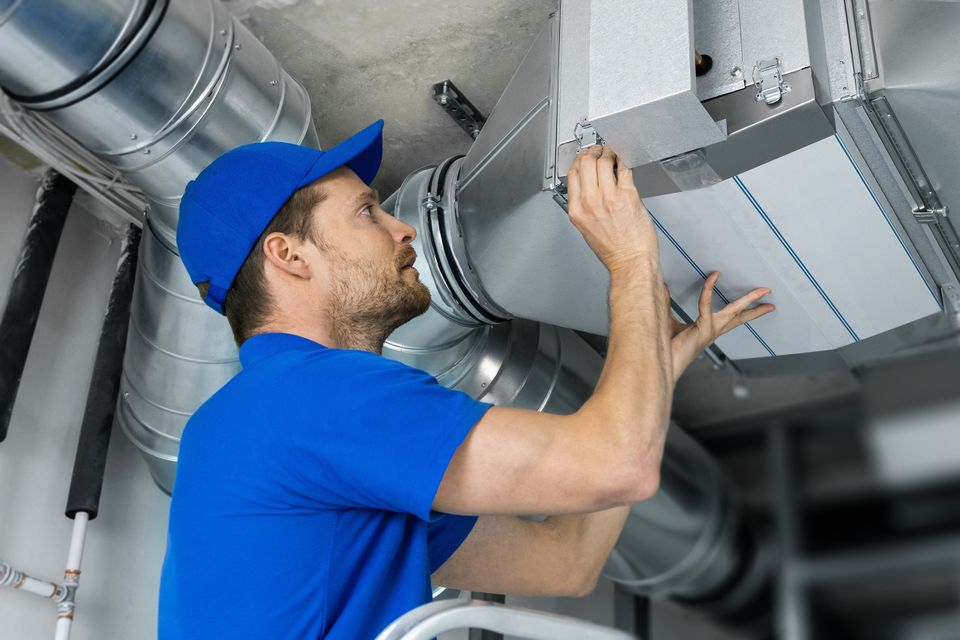1. Replace or Clean Air Filters Regularly
Why It Matters
Clogged or dirty air filters restrict airflow, reducing system efficiency and increasing strain on your HVAC components. This can lead to higher energy bills and shorten the lifespan of your system.
Maintenance Tip
- Replace disposable filters every 1-3 months, depending on usage and air quality.
- If you use washable filters, clean them monthly according to the manufacturer’s instructions.
- Upgrade to high-efficiency filters (such as HEPA filters) for better air quality and HVAC efficiency.
2. Schedule Professional HVAC Tune-Ups
Why It Matters
Routine heating and cooling maintenance by a certified technician helps identify potential issues before they turn into costly repairs.
Maintenance Tip
- Schedule seasonal HVAC maintenance twice a year—once in the spring for your AC and once in the fall for your furnace.
-
Professional tune-ups include:
- Checking refrigerant levels
- Inspecting electrical connections
- Lubricating moving parts
- Testing thermostat accuracy
3. Keep Your Outdoor Unit Clean and Clear
Why It Matters
Debris, dirt, and leaves can clog your outdoor unit (condenser), reducing airflow and efficiency.
Maintenance Tip
- Keep at least 2 feet of clearance around the outdoor unit.
- Regularly remove leaves, twigs, and dirt buildup.
- Gently wash the condenser coils with a garden hose (avoid high pressure).
4. Check and Seal Air Ducts
Why It Matters
Leaky or poorly insulated ducts cause energy loss, forcing your HVAC system to work harder than necessary.
Maintenance Tip
- Inspect exposed ductwork for gaps, holes, or loose connections.
- Seal leaks using HVAC-specific duct tape or mastic sealant.
- Consider professional duct cleaning every 3-5 years to remove dust and allergens.
5. Optimize Thermostat Settings
Why It Matters
A properly set thermostat reduces energy consumption and extends the life of your HVAC system.
Maintenance Tip
- Use a programmable or smart thermostat to adjust temperatures based on occupancy.
- Set the thermostat to 78°F (26°C) in summer and 68°F (20°C) in winter for efficiency.
- Avoid drastic temperature changes that put stress on the system.
6. Keep Vents and Registers Unblocked
Why It Matters
Blocked vents cause uneven heating/cooling and reduce overall efficiency.
Maintenance Tip
- Keep furniture, curtains, and rugs away from vents.
- Clean vents and registers every few months to remove dust buildup.
- Ensure vents are fully open in all rooms to promote proper airflow.
7. Inspect and Maintain the Condensate Drain Line
Why It Matters
A clogged condensate drain can cause water damage and increase humidity levels inside your home.
Maintenance Tip
- Locate the PVC drain line near your indoor unit.
- Pour a mixture of vinegar and water (1:1) into the drain every few months to prevent algae buildup.
- If you notice pooling water, call a technician to clear blockages.
8. Insulate and Weatherproof Your Home
Why It Matters
Proper insulation and sealing reduce strain on your HVAC system by maintaining indoor temperatures more efficiently.
Maintenance Tip
- Seal gaps around windows, doors, and ductwork with weatherstripping or caulk.
- Add attic insulation to prevent heat loss in winter and keep your home cool in summer.
- Use thermal curtains or window films for extra insulation.
9. Monitor Unusual Sounds and Smells
Why It Matters
Strange noises or odors can signal potential HVAC issues that need immediate attention.
Maintenance Tip
- Banging or rattling noises could indicate loose components.
- Hissing may suggest refrigerant leaks.
- Musty smells could be due to mold or a clogged drain line.
- Contact a professional if you notice persistent unusual sounds or smells.
10. Upgrade When Necessary
Why It Matters
An outdated HVAC system struggles with efficiency and may lead to frequent repairs.
Maintenance Tip
- If your system is 15+ years old, consider upgrading to a high-efficiency unit.
- Look for ENERGY STAR®-certified systems to maximize savings.
- Investing in a new system may be more cost-effective than frequent repairs.
Conclusion
Taking care of your HVAC system doesn’t have to be complicated, but regular maintenance is key to ensuring optimal performance and longevity. By following these HVAC upkeep best practices, you can extend your HVAC lifespan, reduce energy bills, and avoid unexpected breakdowns.
If you need professional HVAC maintenance services, contact our expert team today. We’re here to help with everything from seasonal HVAC maintenance to system upgrades, ensuring your home or business stays comfortable year-round.
Need HVAC Maintenance? Get in Touch Today!
Contact us to schedule your HVAC tune-up and improve your system’s efficiency!

